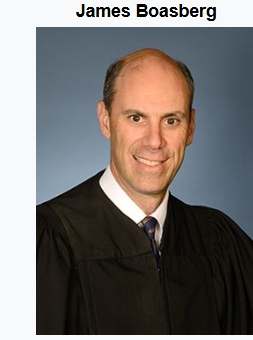Separation of powers? Not according to Judge Luttig and the New York Times!
By Lev Tsitrin
If you learned in a history class that to preclude the possibility of the fledgling US sliding into tyranny, the Founding Fathers split government’s power into three co-equal branches, lawmaking being reserved for Congress while federal judiciary ensures that executive actions comply with Congress-mandated law, you are in for a major reeducation experience — courtesy of the punchline of New York Times’ (paywall-protected) profile of the chief judge of the D.C. district court James Emanuel Boasberg.
 Judge Boasberg got his fame (and the resulting need for New York Times’ feature article) by President Trump calling him a “Radical Left Lunatic” after the judge ordered El Salvador-bound plane full of Venezuelan deportees to return to the US.
Judge Boasberg got his fame (and the resulting need for New York Times’ feature article) by President Trump calling him a “Radical Left Lunatic” after the judge ordered El Salvador-bound plane full of Venezuelan deportees to return to the US.
The article, titled Trump’s Least Favorite Judge Has Friends in High Places overflows with praise to prove to the reader that Judge Boasberg is the “epitome of an impartial judge” (as per “Thomas B. Griffith, a retired judge who served for 15 years on the U.S. Court of Appeals for the D.C. Circuit after being nominated by President George W. Bush;” Judge Boasberg’s other fans are Chief Justice Roberts and Supreme Court associate Justice Kavanaugh.)
Given the collegiality of the profession, such testimonials of high regard from presumed ideological opponents did not surprise me one bit. After all, the chief priority of judges is to keep the public awed and hence, obedient — and infighting would be detrimental to the reputation and power of the judicial clan. What did surprise me, however, was the plainly nonsensical nature of some of those testimonials.
Consider the testimony of “Judge Reggie B. Walton, an appointee of Republican presidents who served with him on the both in the district court in Washington and on the FISA court:” Judge Boasberg is “an even-keeled judge who does what judges are supposed to do, which is simply to do the right thing in every case that comes before him.”
Huh? What does “to do the right thing” mean?
In fact, it was exactly to clearly define the “right thing” that “judges are supposed to do” that I sued a bunch of federal judges. Is it the “right thing” for judges to concoct their own argument for parties, replacing in their decisions parties’ argument with this bogus argument of judges’ concoction, giving victory to judges’ argument — as Judge Lettow of the Court of Federal Claims, and Judge Vitaliano of the Eastern District Court of New York did when I tried to sue the government for its violation of free speech and property rights of author-publishers? I got my answer, sort of — per DAs who defended those judges, in Pierson v Ray federal judges gave themselves “absolute immunity” for acting from the bench “maliciously and corruptly.”
So if honest judging is “the right thing” for a judge to do, and ditto is the dishonest, “malicious and corrupt” judging, can there even be a situation where a federal judge “does not do the right thing,” Judge Reggie B. Walton? Clearly, for a federal judge to not “do a right thing” is manifestly impossible — because any thing that a federal judge does is, per Pierson v Ray, a “right thing.” So if Judge Boasberg — like any other federal judge — can only “do the right thing in every case that comes before him” because any action by a federal judge is of necessity “the right thing,” than what is the point of praising him for “doing the right thing”? It is like praising a cow for chewing cud, or praising the moon for circling the Earth. Can one be praised for a behavior that has no other alternative?
And, saving the best for the last, how about the punchline of the article, in the form of a quote from Judge Luttig: “[Judge Boasberg does] what judges do — it’s their quintessential role. They determine what the law is.”
 Really, Judge Luttig? You circle right back to the opening of this piece! In Judge Luttig’s learned opinion, it is not the legislators who “determine what the law is” — and judges merely follow it. In Judge Luttig’s thinking, it is the judges who define the law. Congress is not the ultimate lawgiver; judges are. Forget separation of powers!
Really, Judge Luttig? You circle right back to the opening of this piece! In Judge Luttig’s learned opinion, it is not the legislators who “determine what the law is” — and judges merely follow it. In Judge Luttig’s thinking, it is the judges who define the law. Congress is not the ultimate lawgiver; judges are. Forget separation of powers!
Ultimately, it was this judicial position that triggered President Trump’s ire, judges taking over the executive’s functions, too.
Constitution is not something that judges follow — it is something they define on the go.
Are the ilk of Judge Boasberg “lunatics”?
No. They are usurping tyrants, the very thing the constitutional separation of powers was supposed to prevent — but failed.
Lev Tsitrin is the author of “Why Do Judges Act as Lawyers?: A Guide to What’s Wrong with American Law”